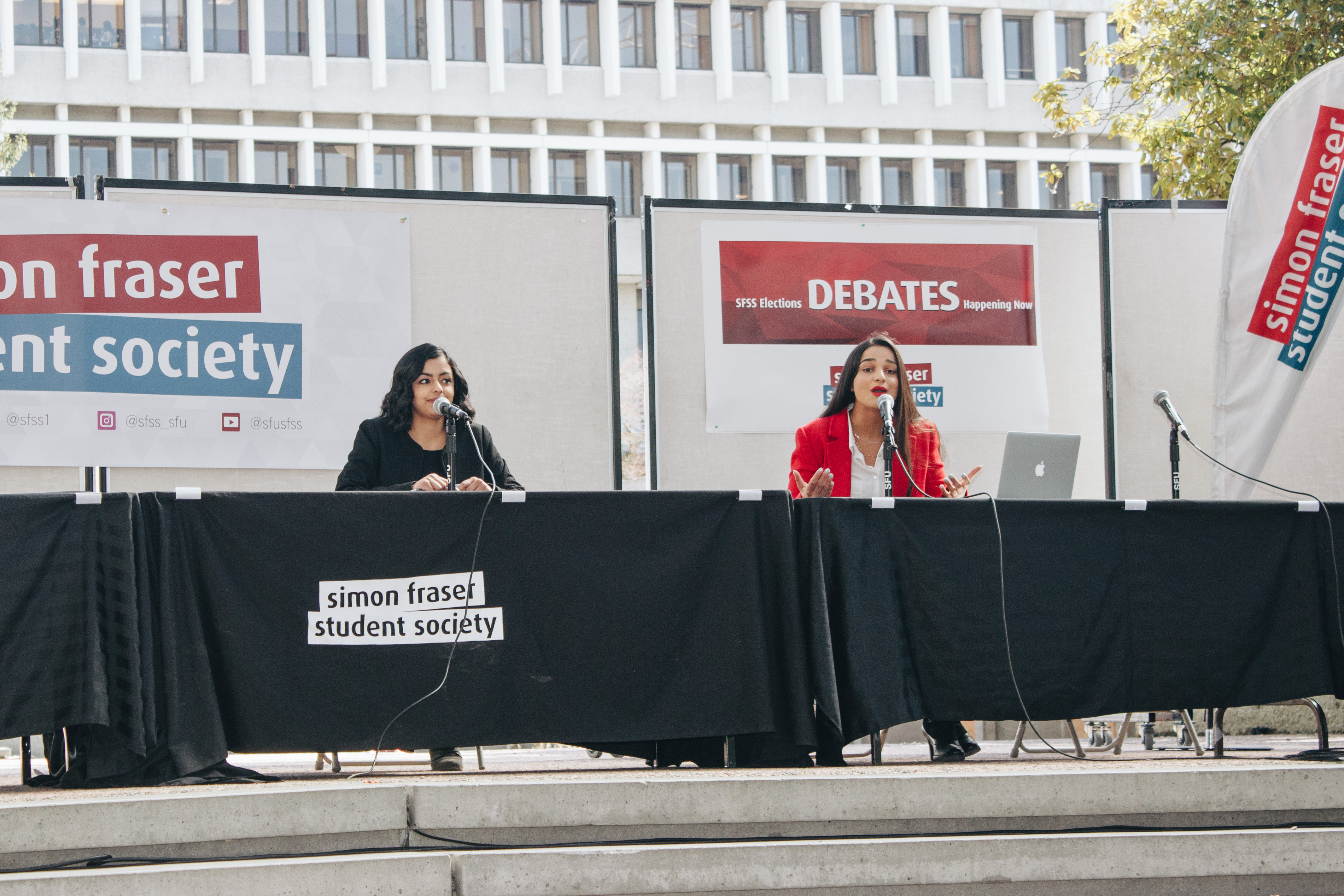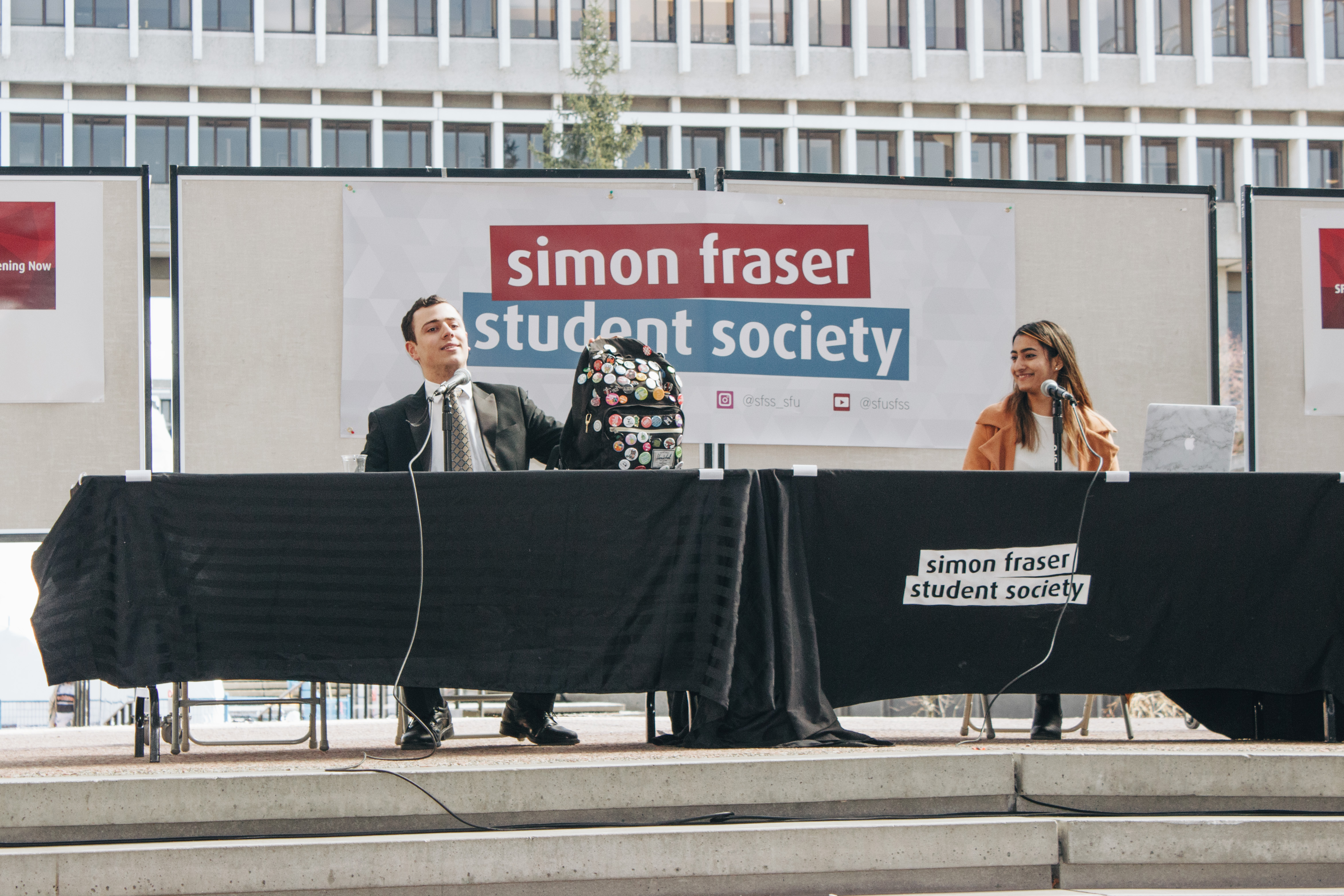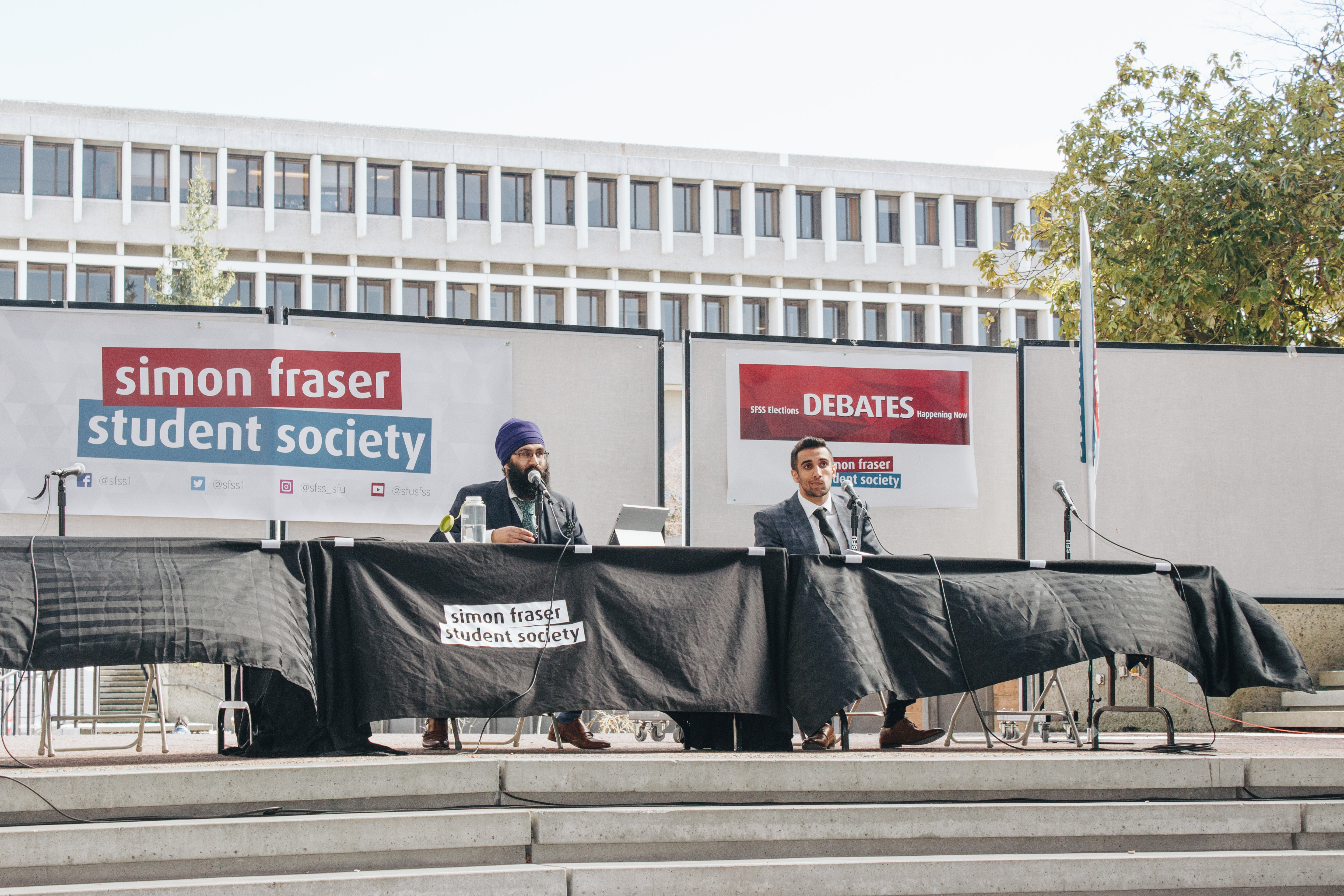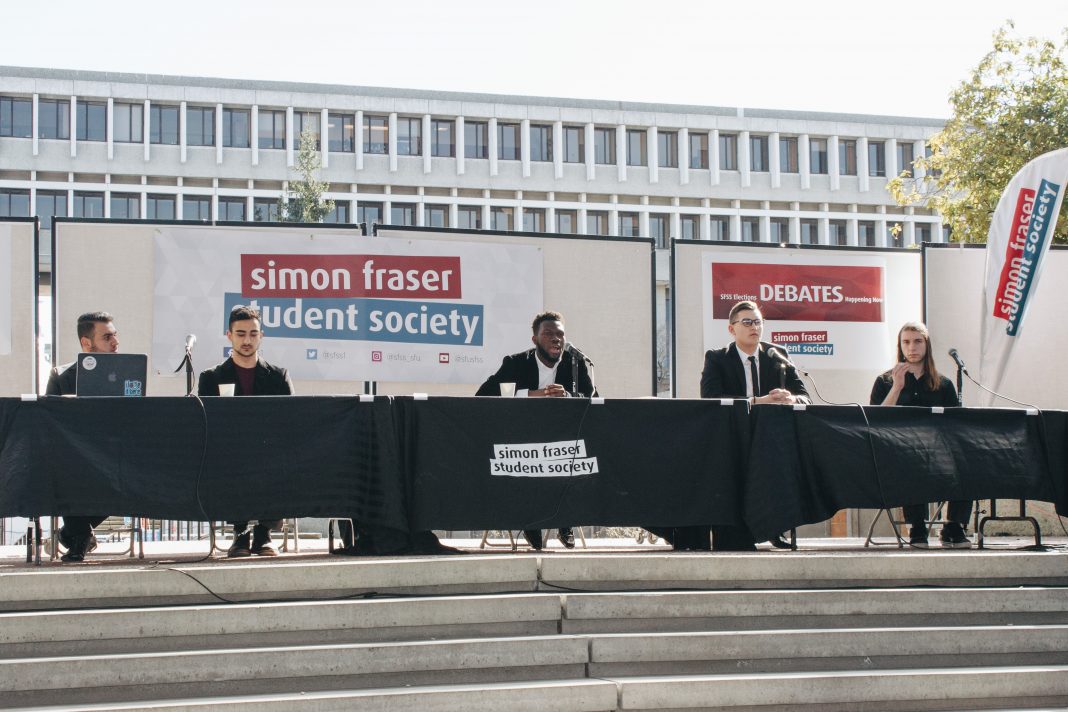The Simon Fraser Student Society (SFSS) hosted two debates in the week prior to the 2018 election voting period: one at SFU Surrey on March 12, and the second at SFU Burnaby on March 15. These debates, moderated by chief commissioner of the Independent Electoral Commission for the 2018 SFSS election Dee Gorn, invited candidates for each position onto the stage for a debate round which involved opening statements, audience questions, submitted questions, and closing statements, to give the candidates present a chance to defend their platforms.
For those who couldn’t make it out to the Surrey debate early in the week or the freezing cold Burnaby debate, The Peak presents a rundown of debate highlights for the SFSS 2018 debates.
At-large representatives
Alexander Krivoi was the candidate for only at-large representative able to attend the debate at Surrey. He emphasized his platform, focusing on the “social structure” of the school, calling SFU a “work-centred school” and stating that one of his priorities as at-large representative would be aiding SFU students in building “friendships that last a lifetime.” As a first-year computing science student, Krivoi admitted he was “not necessarily the most qualified,” when it came to internal experience working within SFU, but he cited four years of Downtown Eastside volunteering as evidence of his ability and desire to connect with the community.
At the Burnaby debate, Mohammed Ali, Arman Mohseni, Wareez Ola, and David Evans joined Krivoi on stage as the remaining candidates for the position.
Ali advocated for a wide variety of priorities such as a more connected community between SFU students, residence, athletics, increased awareness of the Kinder Morgan tank expansion project, needs-based grants, and a gondola. Mohseni’s platform was heavily focused on academic performance. Ola demonstrated a focus on increased SFSS engagement and accessibility of facilities for students on all three campuses. Evans, running as an independent, listed mental health resources on campus, fall reading break, and open textbooks as priorities.
When asked about their stances on increasing the SFSS’s contribution to the food bank, the majority of the candidates advocated for an increased contribution, with a percentage of the revenue from SFSS events being contributed to the service. They also proposed an increase in the number and diversity of events as a means of generating more revenue.
When a question prompted candidates to reflect upon how the current Board operates, candidates advocated for greater transparency. Mohseni and Krivoi mentioned consistency as an area for improvement. Mohseni identified continuity on the previous Board’s initiatives as a priority, so that initiatives could be carried through to the level of actionable steps. Krivoi spoke about conflict resolution between the candidates from different slates who are elected to Board, as he felt that in past years, the Board has experienced dividedness due to the issue.
Faculty of business representatives
Raunaq Singh was the only candidate for business representative present at the Surrey debate. His standout quote involved an assertion that “[business students] on average are definitely more engaged than other students at SFU,” and stated that as a representative, he would aim to implement that attitude to the rest of the student population as well. He advocated for greater involvement of the business representative in business club meetings as a way to establish greater presence among the business community.
The second candidate for the position, Jessica Nguyen, joined Singh in the Burnaby debates. The two candidates agreed on issues such as improving the 200-level course curves, increasing transparency between the SFSS and students, and improving the room-booking system.
Nguyen hinted strongly towards her experience working within the business community as part of JDC West, Young Women in Business, Enactus, and through her interactions with the current SFSS president as a strength for her candidacy.
Faculty of education representatives
Cameron Nakatsu and Leila Amouzandeh were both present at the Surrey and Burnaby debates as candidates for the position of faculty of education representative.
Nakatsu outlined “the classroom experience” as one of the most significant shortcomings he currently sees in the education faculty, promising to create a program that would allow the education student body greater volunteer opportunities in schools. Amouzandeh identified lack of engagement across all three SFU campuses as the main problem with the current education faculty.
In the Burnaby debates, Amouzandeh mentioned the program Steps Forward and increased accessibility as priorities she would pursue outside the faculty of education if elected as education representative, while Nakatsu aspired to bring greater awareness of the Professional Development Program qualification and application process to non-education students at SFU.
Both candidates demonstrated significant prior involvement in the community. Amouzandeh listed experience working as a peer mentor in the faculty, a Student Learning Commons learning and writing peer educator, and a member of the Education Student Association. Nakatsu spoke of his experience as current president of the Education Student Association, a SFSS council representative for the faculty, and student representative for the Faculty of Education Undergraduate Committee.
Faculty of arts and social sciences representatives
None of the candidate for the position of faculty of arts and social sciences (FASS) representative attended the Surrey debate.
However all three candidates, Ali Versi, Mehak Kalra, and Kailyn Ng, attended the debate at Burnaby, where they discussed issues such as increased mental health resources on campus.
Versi advocated for more events such as exercise sessions, meditation sessions, and animal therapy to be provided to students while they wait for mental health services. He also advocated for decreasing the wait time for these mental health services. Kalra agreed with placing a focus on increased events and departmental student union (DSU) meetings to promote mental health on campus. Ng listed more campaigns and an initiative to work for a mental health office, “a place for people to destress and gain knowledge for self-help, as well as drop-in counselling.”
Faculty of science representatives
Natasha Birdi and Gurprince Cheema debated about the level of engagement of students in science DSUs as candidates for science representative.
It was pointed out by Cheema that, while Birdi stated in her platform that engagement in DSUs has been experiencing an upwards trend, his research into attendance at DSU meetings concluded a decrease in engagement.
Birdi attributed the decreased attendance as being a byproduct of a lower food budget supplied for DSU meetings, and pointed to a 50% increase in attendance to the previous year’s science frosh as evidence for greater sustainable engagement.
Birdi was the only candidate for the position present at the Burnaby debate. She took the opportunity to demonstrate her extensive experience working within the faculty of science through science DSUs for the past five years, as well as her experience with the science undergraduate society. “[. . .] I know what needs are urgently required,” she stated.
Faculty of applied sciences representatives
Kiarash Mirsalehi was the only candidate for applied sciences representative that attended the Surrey debate, during which he focused in on increasing the space available on the Surrey campus for mechatronics and software systems students to complete projects such as soldering, which requires dedicated work spaces. He also advocated for greater transparency in the SFSS, stating, “I think the SFSS has done a fairly bad job of being transparent this semester.”
Fuyu Li joined Mirsalehi for the Burnaby debate, where the current faculty of applied sciences representative Jeffrey Leung asked the pair about the long-standing goal of applied sciences representatives to establish an Applied Sciences Student Union.
Mirsalehi maintained the position that “there’s no possible way we can get [the various applied sciences DSUs] to come together,” and instead of focusing on a student union, he advocated for increased faculty meetings between the DSUs and women groups already established in applied sciences. Li advocated for greater engagement and connectivity as a path towards a student union for the faculty, hoping to connect the student unions by giving students more leadership roles.
Mirsalehi had a strong moment in the debates as he highlighted his connection to the applied sciences community already, having gone to all DSU meetings and interacted with their respective presidents, worked on events such as frosh and dodgeball tournaments, and attended events such as the Polar Plunge and Pub Crawl. “How am I going to handle the workload? Well, I’ve been handling a great deal of it already,” he stated.
Li noted that her involved with the applied sciences community has not been as significant as Mirsalehi’s, but pointed to participation in volunteer events, Women in Engineering, and outreach programs as evidence of her involvement in the student community.
Faculty of communication, art, and technology representative
Amrita Mohar is the sole candidate for the FASS representative position. She attended both debates. The key issue she identified for the faculty is that historically, the communication, art, and technology representative does not have much of a presence or a voice in the student government, and this is something she hopes to change moving forward.
Faculty of environment representative
As the sole candidate for faculty of environment representative, Russell Dunsford did not attend the Surrey debate, but was present for the Burnaby event.
“I’m aware that I run unopposed in this election but, despite this, I still take the position and the campaign very seriously,” he stated, citing his involved in the environment DSU, student union, and faculty of environment during his time as a student at SFU.
Faculty of health sciences representatives
Yasmin Khalili was the only candidate for the faculty of health sciences representative position attending the Surrey debate. She reflected upon her faculty as having difficulty engaging students in events such as frosh, and proposed greater connection with other faculties, such as science and business, to learn techniques that will help the health sciences faculty grow.
For the debates in Burnaby, Christina Loutsik joined Khalili as the second candidate for the faculty of health sciences representative. Loutsik proposed impacting students outside of the faculty of health sciences by advocating for needs-based grants and open source textbooks.
To improve student life for health sciences students, Khalili advocated increased involvement of students in the faculty and creating connections between upper- and lower-division courses while Loutsik offered to hold more small-scale events so students can maintain the connects they make through their undergraduate experience.
Khalili also raised a potential initiative to bring forth more grants and awards for students that are based on factors other than academics to help alleviate student stress and financial burden, as well as needs-based grants.
VP external relations
During the debates of VP external relations, candidates Jasdeep Gill and Livleen Sidhu presented different focuses for their platforms in the Surrey and Burnaby debates.
Gill presented a financial focus: she cited BC as the province with the highest amount of debt due to student loans, and outlined a plan to focus on needs-based grants for students, as well as potentially cut down the amount of interest rates the government places on student loans.
Gill also proposed meetings with the appropriate provincial government representatives to allow post-secondary institutions to take on personal debt to initiate student housing projects. Livleen noted that she had not written increasing student housing as a priority on her platform “because when [she] wrote her platform, [she] wanted to focus on things that were feasible.”

A key point Sidhu presented in her platform involved a greater focus on sexual violence prevention on campus. She demonstrated her passion for the issue through her experience providing opinions on SFU’s current sexual violence prevention policy as part of the Student Athlete Advisory Committee.
Gill agreed with Sidhu’s focus on sexual violence prevention, and proposed partnering with other student unions to determine the most efficient policies. “It’s not just an issue that affects SFU, but the entire province, and we can do a better job as a collective,” she stated.
VP university relations
Both Jackson Freedman and Colin Fowler as candidates for VP university relations demonstrated a focus on the gondola project and athletics during the Surrey debate.
Fowler mentioned a tailgate event the current SFSS attempted to organize, which fell through, as an example of the types of initiatives he would follow through on as VP university relations. Freedman, who was a part of the organizing committee for that event as FASS representative, pointed to regulations such as the alcohol policy on campus and due to the National Collegiate Athletic Association as reasons for why the event fell through, and pointed to ongoing efforts to overcome these barriers. Freedman also proposed optimizing the new Student Union Building to showcase the successes of SFU Athletics, and using the television screens around campus to livestream games.
The student group Hi F.I.V.E. made a strong showing at the Burnaby debates, as they questioned Freedman on the inconsistency between his current platform as VP university relations and the actions of the Board last year, on which he was the faculty of arts representative. “This year alone, your Board has rejected all of our funding requests,” stated coordinator Natalie Morin, “how can you convince health advocates like myself that you will keep your election promises?”
Freedman responded by outlining a plan in which the student group would be offered greater visibility and advocacy by him if elected to be a Board member next year. “A commitment SFSS made [this past year] was to contribute $75,000 to mental health in accordance with Health and Counselling [Services]. I’d like to see Hi F.I.V.E. have an important say in how that $75,000 is spent,” he commented.
VP student services
Samer Rihani was the only candidate for VP student services present at the Surrey debate. During his time onstage, he explained his “club matchmaker” proposal for SFU, modelled after a similar initiative from the University of Calgary which had proved effective for the post-secondary institution in increasing club engagement. The matchmaker algorithm would be presented as a questionnaire available on the SFSS website that would use a student’s answers to generate a list of the top clubs or activities offered at SFU that align with their interests.
Simran Sanghera joined Rihani as the second candidate for VP student services at the Burnaby event. The debate at Burnaby largely focused on the mental health of SFU students, which both candidates agreed was a significant priority of their platforms.

VP student life
None of the candidates for VP student life attended the Surrey debate.
The Burnaby debate saw attendance from candidates Tawanda Masawi and Reza Mardan-Dezfouli. Masawi and Mardan-Dezfouli demonstrated significant differences in their platforms in relation to how they would encourage engagement at SFU and their stance on events.
While Mardan-Dezfouli advocated for a priority on in-person meetings between students and Board members to create more personal connections, Tawanda proposed a social media platform for all 16 Board members so that they can be more accessible to students on all three campuses. Tawanda noted that his proposal would require changes to the SFSS’s communication policies, but he commented that Mardan-Dezfouli’s plan of in-person meetings with all students was “not a smart goal, it’s not a cheap goal, and it’s not an attainable goal.”
Tawanda also noted that a key platform point for the InspireSFU slate was increased events. He maintained the position that “events are a temporary solution to a deeper problem, which is social isolation at SFU,” and pledged to target that problem directly through the SFSS. Mardan-Dezfouli retained that an increased number of events were the fastest method for students to engage with clubs and improve student culture.
Tawanda further dug into Mardan-Dezfouli’s campaign, calling his ideas “half-formed” and “generic.” He brought up one of the points of Mardan-Dezfouli’s platform regarding motivational events on campus: “I believe that [Mardan-Dezfouli]’s ideas on motivating people through mental health problems [show that] clearly my opponent has never heard of high-functioning. [. . .] I’m not so sure how hosting motivational speakers is going to address mental health problems at SFU.”
The heated debate between the VP student life candidates prompted Gorn to remind the candidates to “keep our statements peachy.”
VP finance
The Surrey debate saw no attendance from either of the VP finance candidates.
Matthew Chow was the only candidate attending the Burnaby debates. Chow spoke to a deep resistance to increase student fees for the purpose of paying for new student initiatives, advocating instead for cutting back on existing SFSS expenses. He also proposed education workshops for students to promote greater understanding of how the SFSS financial decisions will affect them.
President
At both the Surrey and Burnaby debates, the two presidential candidates Jas Randhawa and Amar Singh took strong opposing stances towards the position.
Singh assumed the responsibility of bringing a fresh voice to the SFSS when he began his Surrey opening statement by clarifying that he “was not a career politician. [. . .] I do not have experience with the SFSS. I’m a fresh face.” When asked if he would classify his opponent as a career politician, he refused to directly answer the question but stated, “I have my own opinions, and we can talk about that afterwards.”
“I don’t want to degrade [Randhawa] for how he approaches things, but I think it’s important to be open and honest. But I just don’t want to degrade him in public.”
Singh further identified a large disconnect between the SFSS and students, and he proposed to mitigate the gap via an initiative titled “SFSS one-on-one” that would focus on building a relationship between students and SFSS.
Randhawa took the opposite stance as he advocated for team culture and minimal turnovers in the SFSS Board of Directors. “I believe experience is an important asset in the role of president.”
“My history of leading events with the student society, advocating for student concerns, and having knowledge of how the student society works will be beneficial for the upcoming year as the student society president.”

“In the past, when non-incumbents came onto the role, they had a difficult time just assimilating in and understanding the relationships that were formed with the university, our staff, and other groups on campus. [. . .] People can take advantage of you, seeing that you are a fresh face and whatnot. It has happened in the past.”
The recent bullying allegations that marked the beginning of this year’s election season was brought up during the Surrey debate. When asked about his views on the events, Amar responded, “We spoke with [the] people involved, [. . .] and they were saying there was no aspect of bullying, there was no aspect of harassment.”
Both candidates were asked about their plans to contribute to the Indigenization of the University as per the Truth and Reconciliation Commission. Randhawa advocated for increased access to student society and transparency as a strategy to promote Indigenization on campus. Singh mentioned connections to Reconciliation Canada as a channel he could utilize to support the cause.
“When it comes to Indigenization on campuses, I have a lot of background experience with our First Nations community, and I believe it’s incredibly imperative that we do what we can,” said Singh. He pointed to his plans to rename the James Douglas study area as an example of how he would support Indigenization of the university.
In the Burnaby debate, both Randhawa and Singh strongly advocated for their slates InspireSFU and ShiftSFU, respectively. When asked why mental health was not part of his platform, Singh pointed to his fellow slate members who had included the cause as one of their main platform points as a way to substantiate his platform.
“When I created my platform, a lot of it was looking at my team and looking at the holistic bigger picture,” he said. However, Singh ultimately agreed the lack of priority on mental health was an oversight of his platform.
Another strong stance Singh took was approachability: he routinely finished off his answers with an invitation to talk further on the matter. At the end of the Burnaby debate, he memorably recited his phone number to take further questions by phone.
The presidential debates overall assumed the predictable pattern of long, sometimes unfocused answers from Singh and short curt responses from Randhawa.





essay for me http://sertyumnt.com/
These days of austerity as well as relative panic about having debt, many individuals balk resistant to the idea of utilizing a credit card to make acquisition of merchandise or maybe pay for a trip, preferring, instead just to rely on the particular t…
do my essay for me http://dekrtyuijg.com/
You mentioned that fantastically!